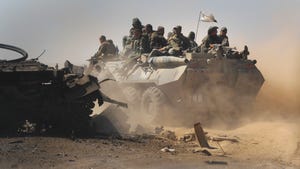Going into their NATO summit in Wales on Thursday, Western leaders are focusing on a failed policy in Ukraine. And so far, they lack a plan to reverse Russia's aggressive moves to bolster separatists' hold on eastern Ukraine.
Just two weeks ago, Ukrainian troops appeared poised to wrap up a military offensive against Russian-backed separatists who'd been fighting an insurgency since April. But the Ukrainian gains were soon reversed as Russia ignored Western economic sanctions aimed at deterring its backing for the separatists and instead poured military support into the rebel cause, according to the Ukraine government and NATO.
On Wednesday, after Ukraine lost ground to a counteroffensive it blamed on Russian troops and weaponry, Ukrainian President Petro Poroshenko indicated he was ready to accept a cease-fire even though pro-Russian separatists still control two major cities in eastern Ukraine. Russian President Vladimir Putin, who continues to deny sending troops or arms into Ukraine, is also signaling interest in a cease-fire.
A truce under these conditions represents a triumph for Putin, according to some analysts. "A cease-fire is in my view a victory for Russia," said Dmitri Trenin, director of the Carnegie Moscow Center.
President Obama and other NATO leaders are meeting in Wales on Thursday and Friday to discuss strategy for countering Russian aggression in Ukraine. One idea they are considering is a quick-reaction force of a few thousand troops that would defend NATO countries from Russian aggression.
Ukraine is not a NATO member, so that idea "is going to look quite paltry," says Andrew Weiss, a Russia expert at the Carnegie Endowment for International Peace in Washington. "The idea there's going to be a neat and tidy resolution before the winter settles in is becoming more and more illusory. Putin has the biggest stakes, and the most levers militarily."
Some in Congress believe Obama should do more.
Senate Foreign Relations Committee Chairman Robert Menendez, D-N.J.,told CNN on Sunday that the U.S. should provide Ukraine "with the type of defensive weapons that will impose a cost upon Putin for further aggression."
But the U.S. and other NATO nations have so far ruled out providing weapons to Ukraine for fear the fighting would escalate into a full-scale war. The U.S. is providing only non-lethal aid, such as food rations, body armor, night-vision goggles and intelligence support.
Beside the rapid-response force, NATO is considering whether to develop a better strategy to counter threats of "hybrid warfare" involving irregular or paramilitary fighters.
The U.S. and its allies also are considering stronger economic sanctions that would further set back Russia's economy. Yet current sanctions have failed to deter Russian involvement in Ukraine, and many European countries are reluctant to impose harder-hitting sanctions that could jeopardize their access to Russian gas supplies that they will need for heat and electricity through the coming winter.
Putin has proposed a seven-point cease-fire plan that would freeze the conflict with separatist forces in control of their last strongholds: the cities of Luhansk and Donetsk, which had been surrounded by Ukrainian troops. The plan calls for an end to Ukrainian shelling of civilian areas, a Ukrainian pull-back from those cities and creation of "humanitarian corridors" that would allow aid and Russian reconstruction teams to reach the separatists, according to Russian state-controlled media.
The plan also would leave a chunk of Ukraine under Russian control, which appears to be Putin's goal for a cease-fire agreement.
Of everything being considered to counter Putin's moves, Weiss said, "nothing on the table is strong enough to change Putin's calculus."


Δεν υπάρχουν σχόλια:
Δημοσίευση σχολίου